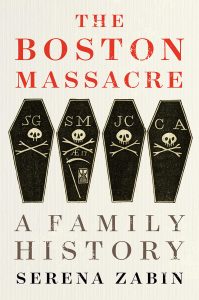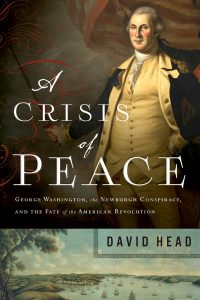The Journal of the American Revolution is pleased to announce The Boston Massacre: A Family History by Serena Zabin (Houghton Mifflin Harcourt) as winner of the 2020 Journal of the American Revolution Book-of-the-Year Award.

Honorable Mention is awarded to A Crisis of Peace: George Washington, the Newburgh Conspiracy, and the Fate of the American Revolution by David Head (Pegasus Books).

The award—an international award dedicated to nonfiction books on the Revolutionary and Founding eras—has been given annually since 2014 to the work that best reflects the mission of the Journal of the American Revolution: to deliver engaging, creative, and intelligent content that makes American Revolution history accessible to a broad audience. The award honors original research combined with a well-crafted narrative that appeals to scholars and non-academic readers alike. Past winners include Quarters by John Gilbert McCurdy, The Indian World of George Washington by Colin G. Calloway, The Martyr and the Traitor by Virginia DeJohn Anderson, and Brothers at Arms by Larrie D. Ferreiro.
The Journal of the American Revolution congratulates Ms. Zabin and Mr. Head.
From our panel of judges:

Any reader choosing to explore Serena Zabin’s book The Boston Massacre: A Family History will be surprised that the book only briefly covers the infamous event. Instead, Zabin has provided an original perspective of Boston in 1770. The tragedy was not the killing of five Bostonians, but rather the societal damage done to the close family relationships that had been formed between the colonists and the British soldiers who they encountered and often welcomed into their homes. Zabin tells the story of how the British forces were accompanied by their own families, who became a part of the insular community that was at the forefront of the tensions. She writes about both men and women in a unique situation, and the focus is not on the Sons of Liberty or John and Samuel Adams. Serena Zabin’s excellent social history is one-of-a-kind, offering a brand-new outlook on the Imperial Crisis.

David Head’s book A Crisis of Peace: George Washington, the Newburgh Conspiracy, and the Fate of the American Revolution reminds us that the surrender of the British at Yorktown in 1781 was surely not the end of the difficulties General Washington had to face. While looking over his shoulder to see what the British might do next, he had to contend with the plight of his own soldiers. The Revolution was not over for him because his men were tired, hungry, and financially strapped. The American public did not seem to care about the army’s situation. It was during this time that some of Washington’s officers planned on marching on Philadelphia and forcing the Congress to address their grievances.A Crisis of Peace is an intense retelling of what could have been the end of the new American nation. His narrative is both enthralling and entertaining, and although the conclusion is known, David Head keeps his readers in suspense. The book is also an interesting view of Washington as a military leader who cared deeply about the difficulties his men faced.
The panel also considered these finalists for this year’s award:
The Cabinet: George Washington and the Creation of an American Institution by Lindsay M. Chervinsky (Belknap Press/Harvard University)
Providing a fresh take on Washington’s presidency, Lindsay M. Chervinsky examines the assertive role that Washington exercised in both the creation of the Cabinet and in America’s acceptance of it. Along the way, Chervinsky provides snapshots of the relationships between Washington and his Cabinet members and examines the ways in which Washington shaped his team as well as the office of the Presidency as he created the institution that has endured as a key part of the office.
Captives of Liberty: Prisoners of War and the Politics of Vengeance in the American Revolution by T. Cole Jones (University of Pennsylvania Press)
This innovative study in a largely overlooked area of the Revolution traces the evolution of prisoner treatment and the ways in which it changed the character of the war itself. In this concise and readable volume, T. Cole Jones provides a convincing argument that the treatment of prisoners occupies a central place in the Revolution and changed the character of the war into one of a truly revolutionary nature.
Franklin & Washington: The Founding Partnership by Edward J. Larson (William Morrow)
In this one-of-a-kind dual biography, Edward J. Larson tackles the long-standing working relationship between George Washington and Benjamin Franklin and examines the ways in which their lives intersected as each played a central role in the founding of the United States.







Recent Articles
That Audacious Paper: Jonathan Lind and Thomas Hutchinson Answer the Declaration of Independence
Supplying the Means: The Role of Robert Morris in the Yorktown Campaign
Revolution Road! JAR and Trucking Radio Legend Dave Nemo
Recent Comments
"Eleven Patriot Company Commanders..."
Was William Harris of Culpeper in the Battle of Great Bridge?
"The House at Penny..."
This is very interesting, Katie. I wasn't aware of any skirmishes in...
"Texas and the American..."
Mr. Villarreal I would like to talk to you about Tejanos who...